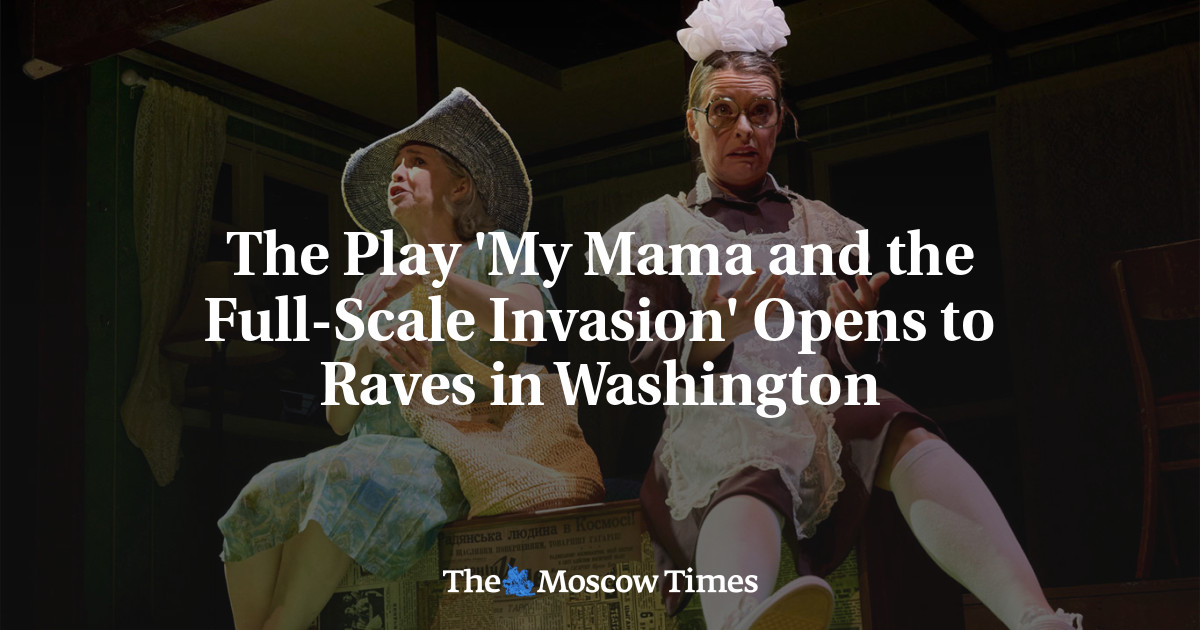
The one-act play by Ukrainian playwright Sasha Denisova “My Mama and the Full-Scale Invasion” opened in Washington, D.C. on September 11 at the Woolly Mammoth Theater. Directed by Yury Urnov and translated by Misha Kachman (who also served as set director), the largely autobiographical play is inspired by Denisova’s 82-year-old mother — Olga Ivanovna — who chose to remain in Kyiv after the outbreak of Russia’s war against Ukraine. The play’s character of Sasha represents Denisova as both narrator of and participant in the on-stage action. Many mother-daughter WhatsApp conversations and years of capturing the conversations she heard at Olga Ivanovna’s kitchen table are the source of Denisova’s rich, fast-paced dialogue in this powerful and surprisingly humorous testament to Ukrainian resistance.
A small cast carries this at once intimate and epic drama, with Holly Twyford capturing the indomitable spirit of Olga Ivanovna, Suli Holum sympathetically embodying Sasha, and Lindsay Smiling giving a strong supporting performance as Olga’s second husband. The play begins with Sasha arriving at her mother’s Kyiv apartment in a last-ditch bid to persuade her to leave the country. What follows is depiction of Olga’s entire life from her birth in a bomb shelter during World War II to the present, all punctuated with increasingly absurd fantasy sequences in which the octogenarian speaks to — and in some cases meets — Zelensky, President Biden, an alien, and even God himself.
The set revolves around Olga’s apartment, and specifically her kitchen, recreated in a large three-walled box on wheels. The typical paraphernalia of a post-Soviet household — including jars of pickled fruit and vegetables and a cabinet full of plates and knickknacks — spill out onto the rest of the stage. The modest but colorful interior of Olga’s apartment, a lonely island in the middle of the stage, is a moving physical representation of Ukrainians’ willingness to stand alone when the world fails to give them the aid they need. Games and toys are a recurring motif: The neon-green projected text that appears above the stage to title each scene is reminiscent of 1980s videogame font, Russian drones are represented by brightly colored toy planes, and in one dream sequence we see Olga dropping a bomb on the Kremlin, projected onto the back screen to look like a videogame simulation.
Perhaps the most unexpected feature of the play is the humor. In the sequences portraying Sasha’s childhood, we see Holum donning a Soviet school girl’s uniform, a bulbous ribbon almost as big as her head adorning her hair as she assumes the exaggeratedly awkward physicality of a child. Towards the end, Smiling puts on a cardboard alien costume complete with antennae. Putin is represented as a mosquito with a human head buzzing across the stage. And even President Biden appears, played by Smiling, to eat stuffed peppers in Olga’s apartment. While laughter initially feels discordant, it punctuates the play to demonstrate Ukrainian resilience in the face of unimaginable horror. And it diminishes the aggressor.
On stage as in Ukraine’s reality, horror is never far from humor. As Olga Ivanovna feeds the U.S. president stuffed peppers, Putin, played by Holum in a grotesque rubber mask, slinks into the apartment. Emitting stomach-turning slurping sounds while drinking homemade cherry liquor through a straw, Putin tells her that the drones raining hell down upon the city are his birthday gift to her. From the sounds and comments in the auditorium, it was clear that the audience was unsure whether to be amused or disturbed by this scene that teetered on the knife edge between comedy and atrocity.
The play provides a nuanced representation of Ukrainian history and identity. Denisova is a proudly Ukrainian playwright who openly references in interviews and the play itself the fact that she spent a substantial portion of her career in Russia, honing her craft in Moscow’s most prestigious theaters. She was a deputy artistic director of the Mayakovsky Theater in Moscow and then main playwright at the experimental Meyerhold Center. A decade ago her play “Light My Fire” was awarded Russia’s highest theatre prize, the Golden Mask.
Denisova left Russia as soon as the war began, but her own relationship with Russia informs the representation of history in the play. By depicting all of Olga Ivanovna’s life, much of it lived during the Soviet Union, Denisova shows how Ukrainian history is also Soviet history. The play makes a direct comparison between present day Russian attacks on Kyiv and those of the Nazis during World War II, with characters speaking of the courage displayed by Ukrainians in both eras and inviting the audience to see modern Ukrainian resistance as drawing upon the Soviet experience.
“My Mama and the Full-Scale Invasion” speaks to a general audience as much as to Ukrainians or those with expertise on Eastern Europe. Denisova expertly interweaves the dialogue with explanations of Ukrainian and Soviet terminology and history unfamiliar to a Western audience. The program, meanwhile, provides a helpful timeline of Ukrainian history, as well as a glossary explaining terms such as “Ruscist,” a word created by Ukrainians to label the fascist ideology driving Russia’s invasion.
At the heart of this world-shaking event are a mother and daughter who love each other fiercely yet often fail to express it or to understand each other’s motivations. Denisova’s play powerfully foregrounds the human face of the war, illustrating the immense physical and psychological toll on the Ukrainian people. Olga Ivanovna stands for every Ukrainian civilian who refuses to be cowed by Russian aggression.
“My Mama and the Full-Scale Invasion” is playing through October 8 at the Woolly Mammoth Theater in Washington, D.C. Tickets can be bought here. For further details on the cast and crew, as well as an interview with Denisova, visit the production’s online playbill here.





